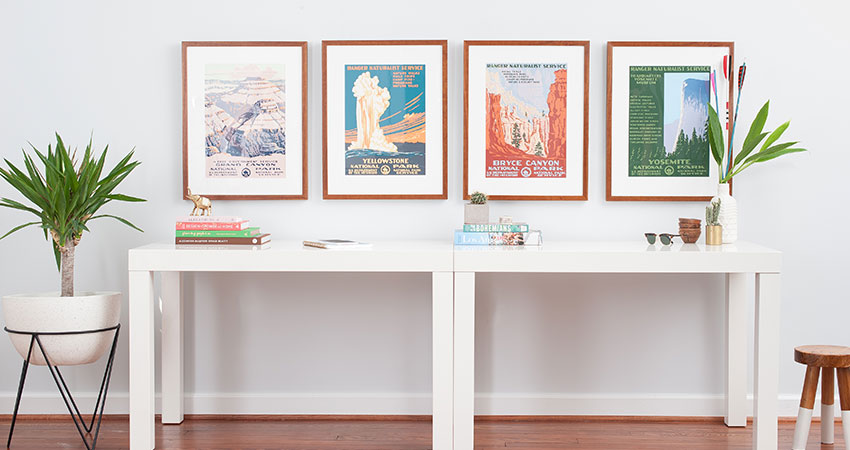Susan Tynan, founder and CEO of Framebridge, said there came a moment where she realized the custom framing startup had truly arrived: Customers started using the company name as a verb, just like Googling is a verb universally understood to represent doing a web search.
“As marketers, you can share in my excitement, when we finally got that dream come true,” Tynan told attendees at IRCE in Chicago. “We heard them start to say things like, ‘You should commemorate that, you should share it, you should Framebridge that.’”
Tynan said she decided to start Framebridge five years ago after a bad experience at a custom frame shop made her realize the category was rife for disruption. The person behind the counter wondered why she wanted to frame posters of national parks she and her sister had visited, and asked lots of questions about the types of materials they wanted to use.
“When we finally figured out how much it cost after about a half hour, I walked out thinking, the whole specialness of this is ruined,” she said. “But more importantly I thought, I’ll never do that again. So, the impetus for Framebridge was this belief that people have special things, and if we make it easier for them to frame them, they’ll do it much more than they do today.”
Tynan quoted from Aaron Levy, the founder of Box, who said the value in startups is that they’re created solve problems in an elegant way, and then the trick is to protect that while you scale. “I certainly found that to be the case,” she said. “People who can scale the unscalable will win.”
As an example of a scale issue overcome, Tynan said Framebridge had a hiring problem early on in that it needed people with technical chops who also had good handwriting, for the personal notes left in each order.
“What’s crazy about our business is, people give us money and something they care about before getting anything from us in return,” she said. “We had to make sure we’re tell them, ‘I see what you framed with us and appreciate it’ – we’d be crazy not to. We were seeing these amazing adventures and achievements. The thank you note was our way of saying, we see what you’ve done and we’re proud of you.”
But operations and finance couldn’t see how that would scale as the company grew, Tynan said – especially on days when there was no one in the building that day with good handwriting skills was out and orders had to go out the door.
“We realized that what really mattered here is we have humans on our team saying, we saw your piece and it’s special,” she said. “So, we built a tool that allowed people to type in the note. At the end of the day the handwriting didn’t matter – it was the human-to-human connection.”
As an example of putting the customer first, Tynan explained how last Christmas the company had to make the tough call of pulling up its holiday order cutoff by two days, because production-wise they were in a position where they would jeopardize orders arriving on time if they kept selling.
“Those are very significant selling days, as all of you in this room know, and it made a big impact on us and our performance for last year,” she said. “But it was the right thing to do. With all that emotion on the line (of holiday gifts) our job was to keep delivering for the customers we had. That experience, while tough, it was really clear to everyone in every function in the company that it was what we needed to do.”
As to why Framebridge decided to start opening store locations last year, Tynan said it became readily apparent that there were instances where they had to be physically in front of customers in order to serve them and create a great experience.
“This really came from looking at customer behaviors,” she said. “Our corporate office is in Washington, DC, and people started googling it and coming in with their art. So our controller had to stand up and walk over and try to figure out why someone came in with a set of art prints. It was impossible to ignore. People had things they wanted to run by us in person, so in order to be as friction free as possible we had to meet them wherever they were.”
While a lot of the initial marketing messaging for Framebridge was around the fact that it made custom framing easier and less expensive than traditional shops, Tynan said the nature of what they were doing led to revise the story a bit.
“Even in the way we communicate in our marketing, we start out by saying, it’s cheaper and easier,” she said. “Then we realized what we were doing was much more significant. So, we told people, you should really do this, because surrounding yourself with the things that matter to you, with your life’s best moments will remind you to continue living that way. We truly realized our business is almost a gratitude journal.”


So the person who waited on her dared ask questions about how she wanted her artwork framed and THAT made her start a company? Not calling bs, but that sounds… odd.
Hi Jeremy,
My impression was, not just that they asked questions about the framing but were not very professional or courteous, to the point of in effect asking “why are you even framing this? It’s not even artwork!” She hinted also that it was uber expensive.
Mike